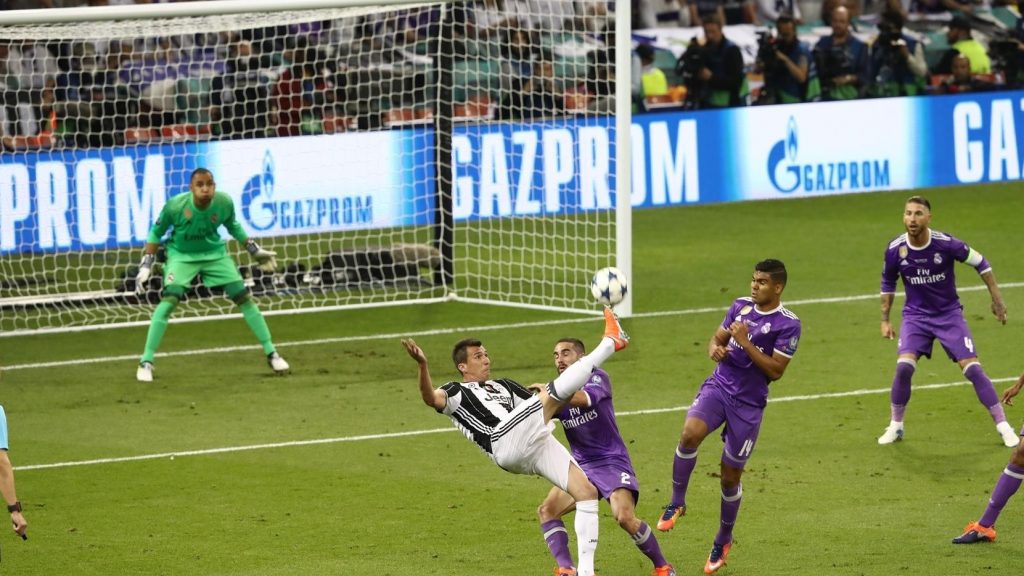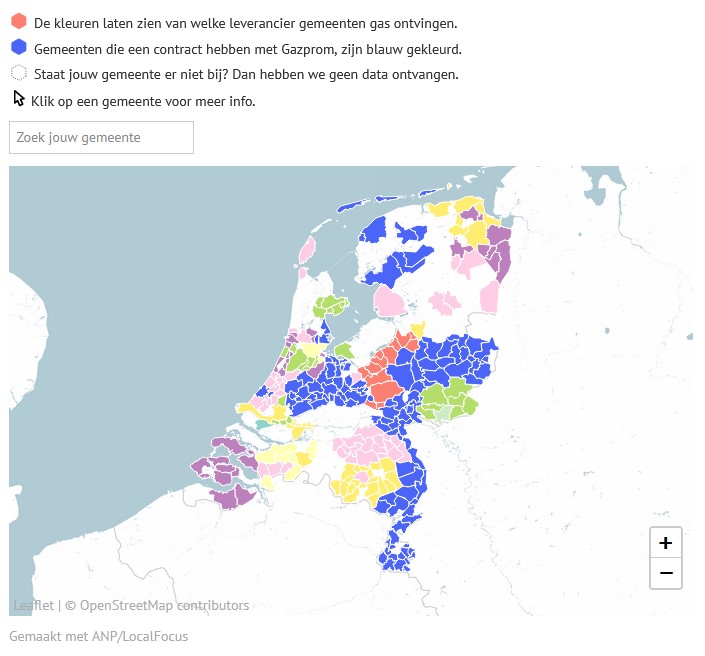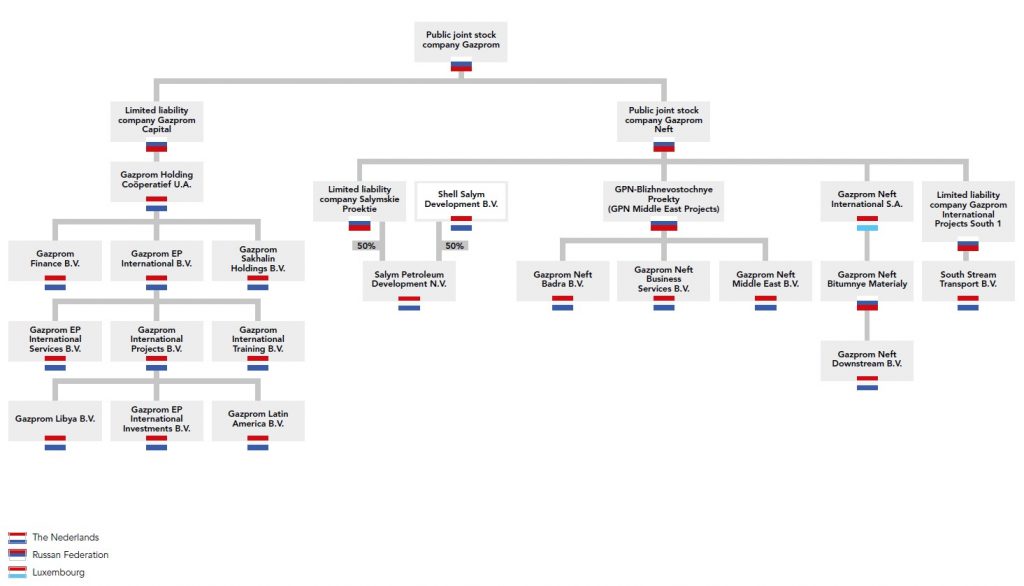Condemnation of Putin’s war in Ukraine has been widespread throughout Europe. But next to many other European countries, the Netherlands has played a significant role in enabling the European strategy of the Putin-controlled fossil-gas corporation, Gazprom. We summed up Gazprom’s three major interests in the Netherlands: infrastructure, market control and tax avoidance.
Best known as the sponsor of the European football tournament: the Champions League, Gazprom is the largest gas extractor in the world and one of the largest contributors to the Russian federal budget through tax revenues. The Putin regime controls Gazprom’s strategy and policy since 50% of the shares in the corporation are owned by the Kremlin. This leads to Gazprom playing a significant role in the regime’s geo-political power play.

To gain power, Gazprom employs an aggressive growth strategy whereby low market prices are offered to take customers from competitors. Next to this, Gazprom makes large investments in infrastructure to increase its productive capacity in terms of new gas fields, gas pipelines, or gas storage, allowing it to slowly monopolise gas production and distribution. This allows Gazprom to grow rapidly and gain control of large parts of the European gas infrastructure and market.
Gazprom’s infrastructure
To talk about gas infrastructure, and not talk about the Netherlands, would be an insult. Known as the ‘gas roundabout’ of Europe, Dutch infrastructure is used to trade, store, and distribute substantial amounts of gas throughout Europe. This makes Gazprom extremely interested in the Netherlands for building a European reliance on its gas and has led to them owning 13.6% of Dutch gas storage capacity according to Follow the Money.
In terms of extraction and distribution, Wingas and Wintershall Noordzee are two of Gazprom’s most lucrative acquisitions in the Netherlands. Gazprom owned Wingas has gas storage and pipelines all over the Northwest of Europe. Wintershall Noordzee is half Gazprom-owned and has 29 gas extraction facilities off the Dutch coast, making it one of the larger players there. Wintershall accounted for over 10% of the gas extraction in the Dutch part of the North Sea in 2019.
Gazprom’s market control
When we get onto the topic of market control, we come even closer to our home of Wageningen. Of the 284 municipalities in the Netherlands that data could be found for in 2020, 120 of them had contracts with Gazprom Energy – the Dutch Branch of Gazprom based in Den Bosch – including our neighbors Utrecht, Renkum, Arnhem, and Veenendaal.
Even though Wageningen municipality does not have a Gazprom contract, Gazprom may still provide the gas that heats your home. This is because gas is like electricity: it is mixed and stored regardless of where it came from, and when one company does not have enough, they buy it from another on the gas exchange – where Gazprom stores a lot of gas. As well as the 120 municipalities, over half of the Water Boards in the Netherlands have contracts with Gazprom.
Although the director of the Dutch branch of Gazprom resigned earlier this year, its activities seem set to continue for the near future. Over the past decade Gazprom Energy has offered lower prices than that of competitors and signed long-term gas contracts with Dutch municipalities and water boards, providing a guaranteed stream of money for Putin’s regime. To make matters worse, the corporation is so far immune to European sanctions since there is such a heavy reliance of Europe on Gazprom gas.
Upon request to cancel these contracts following Putin’s invasion of Ukraine, many of these municipalities responded that this would only further fund the Putin regime since the contracts are subject to cancellation fees. That said, public opinion has succeeded in pressuring the Dutch Minister for Climate and Energy Rob Jetten to write an open letter to parliament stating that all Gazprom contracts should be ended or ‘wound down’ by October 2022. Wound down is especially important wording here, since Utrecht has only committed to not renewing their contract in January 2024.
Gazprom’s tax avoidance
Some of us prefer avoiding the subject of tax, but many corporations love to avoid paying it. Sixteen subsidiaries of Gazprom can be found in Amsterdam, of which some have offices and employees, and others simply have mailboxes. These are the ‘baby companies’ of Gazprom who avail of the Dutch tax-haven to channel money back to the Putin regime from Gazprom operations in Vietnam, Ireland, Iraq, India, the UK, Uzbekistan, the list goes on. The combined assets of these subsidiaries are worth at least 26.5 billion USD according to an investigation by SOMO.
According to the investigation, the responsibility for facilitating Gazprom’s activities in the Netherlands over these years primarily lies in the regulators, namely the Dutch Ministry of Finance and the Dutch Central Bank (DNB) who constructed this tax haven to attract tax-avoiding corporations. On the business side, there are well-known Dutch firms that assist Gazprom’s operations such as the accountancy firm Pricewaterhouse Coopers or PWC, and the law firm Houthoff. The latter was also coined the ‘Kremlin office,’ since they provided legal services to the Russian Federation and associated partners. Following pressure from public opinion Houthoff announced that they will sever ties. PwC have yet to make a move.
Here we have only scratched the surface of the web of relations between the Netherlands, Gazprom, and the Putin regime. If we look further to Germany, England, the US and beyond, we only get a clearer picture of how complicit many countries have been in allowing a war-hungry dictator and his supporters to rise to power. So next time we condemn the war in Ukraine, let us keep in mind that the responsibility for enabling such a dangerous man to rise to power lays well outside Russian borders and sometimes even sits on the table of our own municipality.




